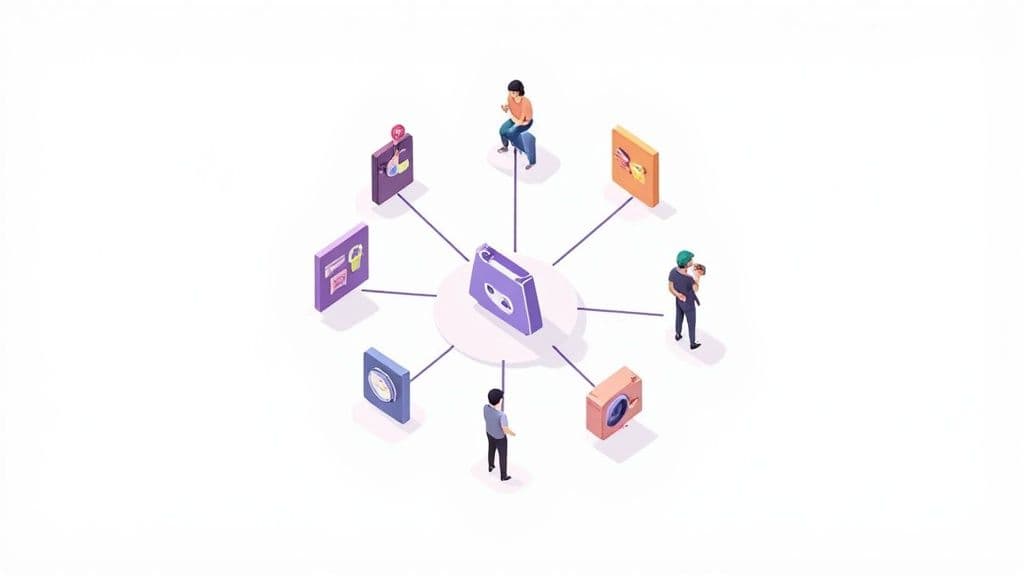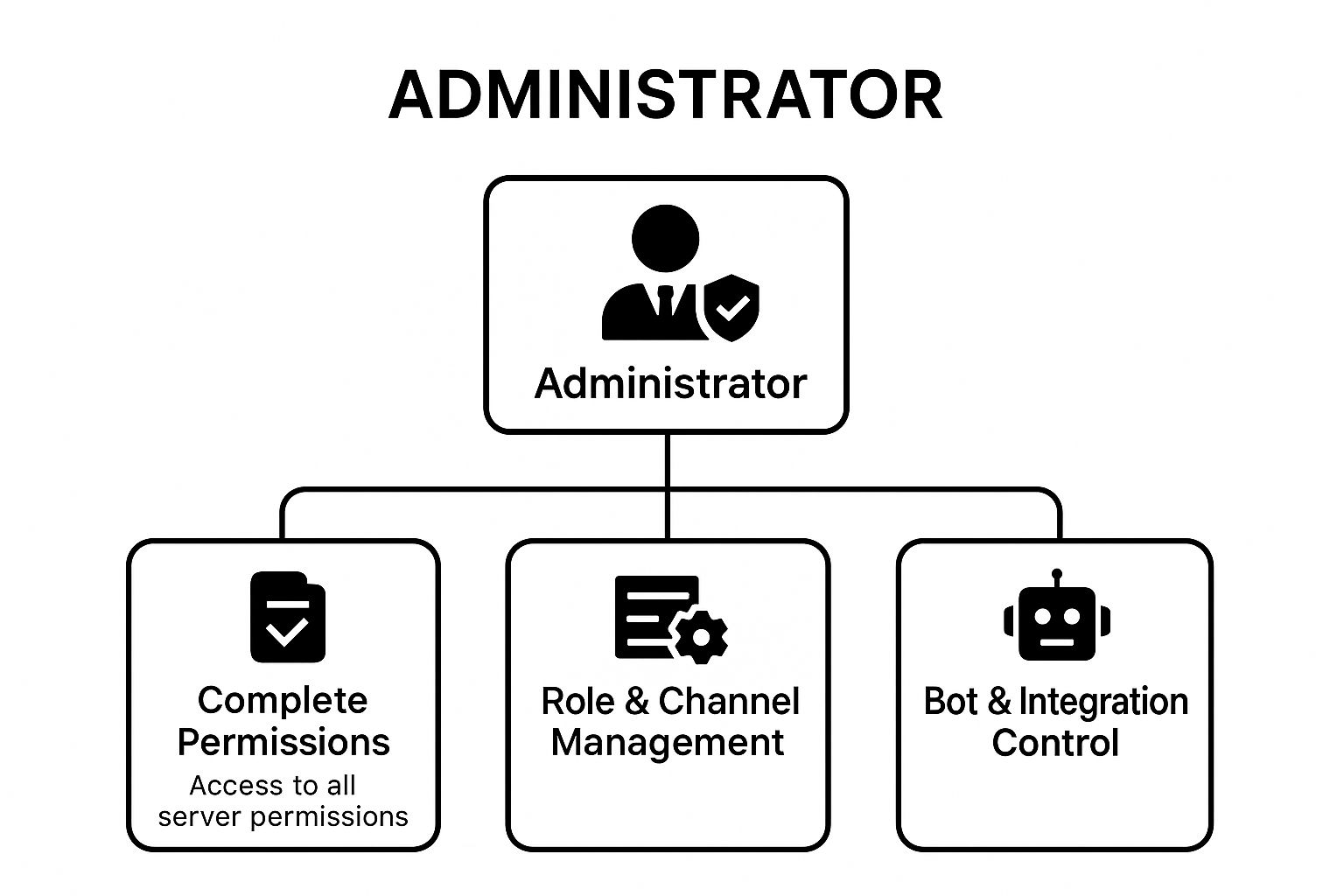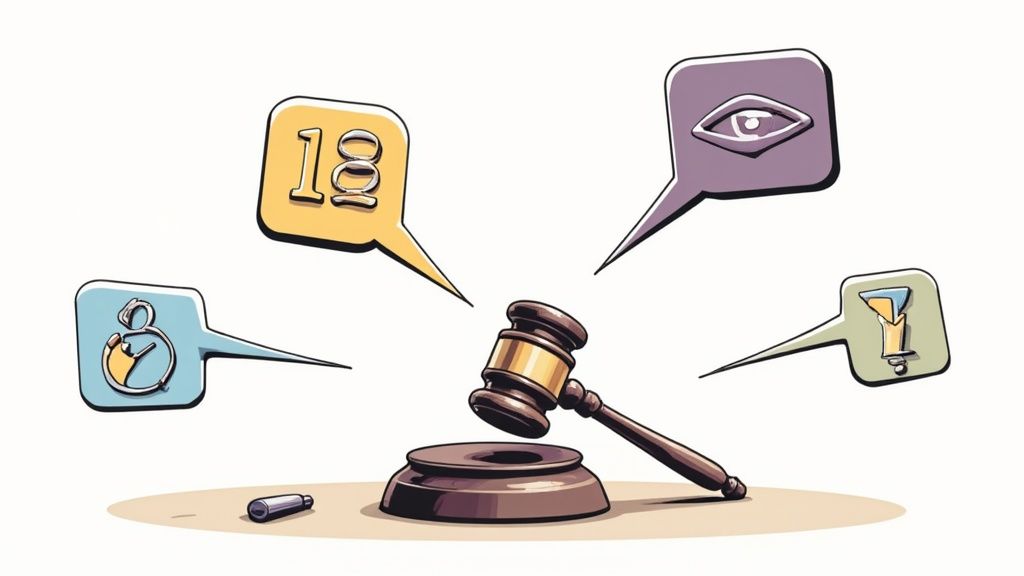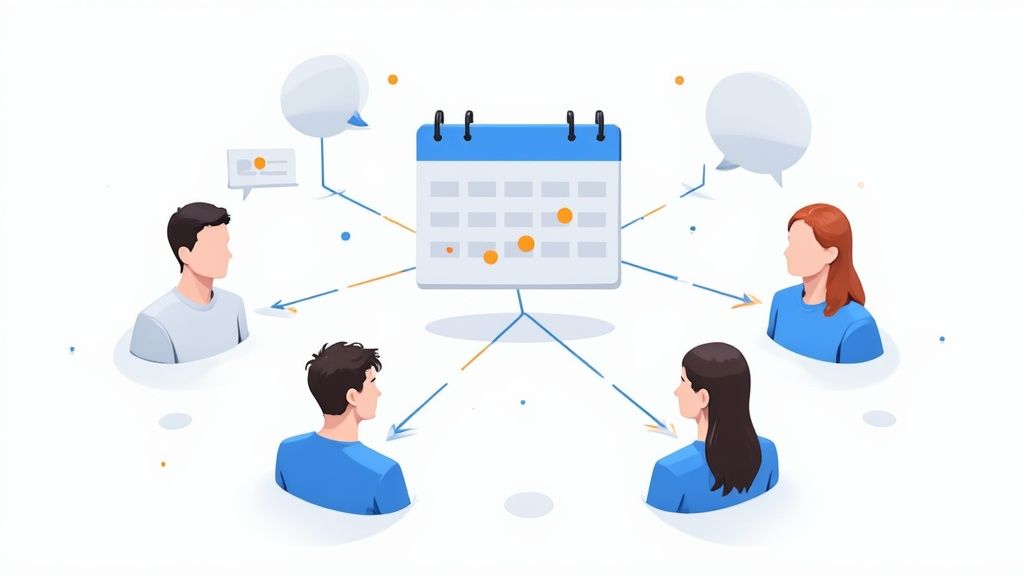8 Essential Roles for Discord Server Success in 2025

Welcome, server builders! You've meticulously created the channels, set up the bots, and invited your first wave of members. So, what’s the secret ingredient that transforms a chaotic server into a thriving, self-sustaining community? It all hinges on a well-defined structure built on smart roles.
The right roles for Discord do far more than just assign permissions; they create leaders, empower dedicated members, and build an essential framework for scalable growth. Think of them as the skeleton of your community, providing the support needed to expand without collapsing under pressure. Forget just the basics, a strategic role hierarchy is your best defense against member churn, moderator burnout, and organizational chaos.
In this guide, we're moving beyond the obvious to give you a strategic blueprint. We will break down the 8 most crucial roles every successful server needs, from the foundational Administrator and Moderator to specialized positions like Bot Manager and Event Organizer. You'll learn what each role does, why it's vital, and exactly how to implement it to foster a positive, engaging, and well-managed environment. Let's build a better community, one role at a time.
1. Administrator
Kicking off our list of essential roles for Discord is the big one: the Administrator. Think of this as the "keys to the kingdom" role. It’s the highest-ranking position on a server, granting unrestricted power over every single setting, channel, and member. An Admin can do it all, from creating and deleting roles to kicking members and even deleting the entire server.
Because this role holds absolute power, it's typically reserved for the server owner and maybe one or two highly trusted co-founders. You'll see this setup in large-scale operations, like a gaming community founder managing a 10,000+ member server or the core team behind a major Web3 project's fan community. The Administrator role is the bedrock of server security and management, ensuring someone has the final say and ultimate control.
Best Practices for Admin Roles
Granting this level of permission isn't something to take lightly. A compromised Admin account can lead to a complete server takeover, a catastrophic event for any community.
- Limit the Circle: Keep the number of Administrators to an absolute minimum, ideally just two or three people. The more Admins you have, the more potential security risks you introduce.
- Enable 2FA: Make two-factor authentication mandatory for all accounts with Admin privileges. This adds a critical layer of security that can prevent unauthorized access.
- Audit Regularly: Periodically review who has the Administrator role and what actions they've taken using the server's Audit Log. This helps ensure the power isn't being misused.
Pro Tip: Establish clear, written protocols for major server changes. Any decision to add a high-level bot, overhaul the channel structure, or change verification rules should require agreement from all Administrators to prevent unilateral, and potentially damaging, actions.
The following diagram breaks down the core pillars of an Administrator's power.

This hierarchy illustrates how the Administrator's authority encompasses total permission control, structural management of roles and channels, and technical oversight of bots and integrations, making it the most powerful of all roles for Discord.
2. Moderator
If the Administrator holds the keys to the kingdom, the Moderator is the royal guard patrolling the castle walls. This role is the backbone of day-to-day community management, focused on enforcing rules, fostering positive interactions, and keeping the peace. Moderators are granted permissions to manage messages, timeout disruptive users, and guide conversations to ensure the server remains a welcoming and safe environment for everyone.

You'll find active moderator teams in almost every successful community, from the massive r/gaming Discord server keeping chats on-topic to Twitch streamer communities where mods keep spam out of the live discussion. They are the first line of defense against trolls and the primary point of contact for members needing help, making them one of the most vital roles for Discord server health. A well-moderated server is a healthy one, capable of growing without descending into chaos.
Best Practices for Moderator Roles
Empowering moderators effectively requires a balance of trust, clear guidelines, and the right tools. A poorly managed mod team can be just as disruptive as no team at all.
- Establish Clear Guidelines: Create a "moderator handbook" that outlines server rules, escalation procedures, and specific consequences for rule violations. This ensures consistent enforcement.
- Automate with Bots: Use moderation bots like MEE6 or Dyno to handle routine tasks such as filtering spam, warning users for rule-breaking, and logging moderation actions. This frees up human mods to focus on nuanced situations.
- Create a Mod-Only Channel: A private channel for your moderation team is essential for coordination, discussing difficult cases, and sharing important updates or warnings. This is where you can refine strategies and provide support.
- Provide Training: Equip your team with skills in de-escalation, conflict resolution, and unbiased enforcement. A trained moderator can defuse a tense situation before it requires a kick or ban.
Pro Tip: Implement a rotating schedule or "on-call" system for your moderators to prevent burnout. Community management can be draining, and ensuring your team gets adequate breaks is crucial for long-term server stability and a happy mod team.
This role is essential for maintaining the quality of all server communications, including what you share in key channels. For insights on optimizing one of the most important channels, check out our guide on boosting your Discord announcement channel.
3. Community Manager
Moving beyond pure moderation, the Community Manager is one of the most strategic roles for Discord servers focused on growth and health. This role is less about enforcing rules and more about cultivating a vibrant, welcoming, and active environment. They are the social architects of the server, responsible for planning events, sparking conversations, and making members feel valued and connected.
A Community Manager bridges the gap between the server leadership (Admins, Moderators) and the general member base. You'll see this role in action on large-scale gaming servers run by companies like Riot Games, where dedicated teams organize tournaments and Q&A sessions, or in NFT project communities that rely on daily engagement to maintain project momentum. They are the heart of the server, ensuring it's a place people want to return to every day.

Best Practices for Community Manager Roles
A great Community Manager can transform a quiet server into a thriving hub. Their success relies on strategy, empathy, and organization.
- Create a Content Calendar: Plan events, themes, and discussion topics in advance. A calendar with recurring activities like "Trivia Tuesdays" or "AMA Fridays" gives members something to look forward to and builds consistent engagement.
- Establish Feedback Loops: Actively solicit feedback from members through polls, suggestion channels, or direct conversations. This makes the community feel heard and empowers them to help shape the server's future.
- Use Analytics to Inform Strategy: Leverage Discord's Server Insights or third-party bots to track metrics like member activity, message volume, and audience retention. Use this data to understand what's working and what isn't. To dive deeper, you can learn more about community engagement best practices on domino.run.
Pro Tip: Develop contingency plans for low-participation events. Instead of canceling, have a backup plan ready, like switching from a voice event to a text-based Q&A or having a few "hype" members ready to jump in and get the conversation started.
The diagram below highlights the primary functions that define the Community Manager's impact.
This visual shows that a Community Manager's duties revolve around actively creating a positive user experience through event organization, engagement analysis, and cultural development, making them a crucial driver of server vitality.
4. Support Agent
For communities built around a product, service, or complex topic, the Support Agent role is indispensable. This is your frontline team dedicated to helping members navigate issues, answer questions, and get the most out of what your community offers. Think of them as the friendly guides who ensure no one gets lost, frustrated, or ignored, turning potential problems into positive interactions.
This role is critical in servers for software companies, where agents troubleshoot bugs, or in educational communities where they help students with platform issues. In a bustling Web3 project's Discord, a Support Agent might guide users through wallet connections or explain transaction failures. They are the engine of user retention, providing the hands-on assistance that builds trust and loyalty.
Best Practices for Support Agent Roles
An effective support system can make or break a community's reputation. A well-organized Support Agent team ensures efficiency and member satisfaction.
- Create a Knowledge Base: Develop comprehensive FAQ documents or a knowledge base and pin them in relevant help channels. This empowers users to find answers themselves and reduces the agents' workload.
- Leverage Support Bots: Implement bots (like a ticket system bot) to create private support threads, handle common questions with automated responses, and organize incoming requests.
- Establish Escalation Paths: Not every agent can solve every problem. Create clear, documented procedures for escalating complex issues to moderators, developers, or other senior team members.
Pro Tip: Use template responses for frequently asked questions. This ensures consistency in your answers, saves time, and allows your Support Agents to handle a higher volume of inquiries without sacrificing quality. Track common issues to identify systemic problems that the core team may need to address.
5. Content Creator
Next on our list of essential roles for Discord is the Content Creator. This role is the lifeblood of an engaging server, responsible for producing, curating, and managing the materials that keep members coming back. They are the storytellers, educators, and entertainers of the community, crafting everything from server announcements and event promotions to educational guides and multimedia content.
This role is crucial for transforming a static chat room into a dynamic hub of activity. You’ll see it in action on servers for popular Twitch streamers who post stream highlights, in educational communities where creators share exclusive learning materials, or in art servers where they showcase member creations and host design challenges. The Content Creator role ensures a steady stream of value, making the server a destination rather than just a notification.
Best Practices for Content Creator Roles
A great Content Creator turns passive members into active participants. Empowering them with the right tools and strategy is key to community growth.
- Establish a Content Calendar: Plan content in advance to maintain a consistent posting schedule. This builds anticipation and helps members know when to expect new, valuable updates or activities.
- Leverage Analytics: Use server insights or bot analytics to understand what types of content resonate most with your audience. Double down on what works, whether it's video tutorials, member spotlights, or AMAs.
- Encourage User-Generated Content: The best content often comes from the community itself. Create channels and initiatives that encourage members to share their own creations, guides, or experiences, and then feature the best submissions.
Pro Tip: Develop a clear brand voice and visual style for all server content. Consistent branding in announcements, graphics, and even emoji usage makes the community feel more professional, cohesive, and memorable, strengthening its identity.
The diagram below illustrates the core responsibilities of a Content Creator.
This structure highlights how the Content Creator drives value through a mix of original production, community curation, and strategic planning, making it one of the most vital roles for Discord servers focused on engagement.
6. Event Organizer
Next up on our list of crucial roles for Discord is the Event Organizer. This is the lifeblood of an active community, a specialized role dedicated to planning, coordinating, and executing activities that bring members together. An Event Organizer transforms a static chat room into a dynamic, engaging hub, creating everything from high-stakes gaming tournaments to educational workshops and casual social hangouts.
This role is vital for fostering a sense of community and preventing member stagnation. You'll see Event Organizers running weekly game nights in a content creator's server, coordinating AMAs with project founders in a Web3 community, or launching monthly art contests in a server for creatives. They are the architects of shared experiences, giving members compelling reasons to return and participate actively.
Best Practices for Event Organizer Roles
A well-run event can create lasting memories and bonds, but a poorly managed one can lead to frustration. Empowering your Event Organizers with the right permissions and guidelines is key.
- Grant Necessary Permissions: Event Organizers need specific powers, like creating events, managing stage channels, using the
@everyoneor@heremention (sparingly), and muting/moving members in voice channels during events. - Create Dedicated Channels: Set up specific channels for event announcements, sign-ups, and feedback. This keeps event-related chatter organized and prevents it from overwhelming general discussion channels.
- Recruit Event Helpers: For larger events, allow the main Organizer to deputize temporary "Event Helpers." These volunteers can assist with logistics, answer questions, and manage participants, ensuring the main organizer isn't overwhelmed.
Pro Tip: Create an "Event Toolkit" for your organizers. This could be a private channel or a Google Doc containing pre-made announcement templates, event checklists, a list of reliable bots for polls and RSVPs, and a post-event feedback form. This empowers them to run high-quality events consistently.
The following diagram illustrates the key responsibilities an Event Organizer juggles.
This structure shows how the role balances creative planning with practical logistics and community interaction, making it one of the most impactful roles for Discord servers focused on engagement.
7. VIP/Premium Member
Next on our list of key roles for Discord is the VIP/Premium Member. This role is all about recognition and reward, creating an exclusive tier for your most dedicated, supportive, or paying community members. It’s a powerful way to acknowledge loyalty and incentivize deeper engagement by granting special perks and a higher status within the server.
You’ll find this role frequently used by Twitch streamers rewarding their top subscribers, educational communities offering premium content access, or NFT projects giving special channels to holders. The VIP/Premium Member role transforms passive members into active supporters by making them feel valued and giving them a stake in the community's success. It’s a cornerstone of building a sustainable and engaged server.
Best Practices for VIP/Premium Roles
Creating a VIP tier requires a delicate balance; you want to make it feel special without alienating your general member base.
- Define Clear Criteria: Be transparent about how members can achieve VIP status. Is it through a monthly subscription, reaching a certain activity level, or by being a long-term supporter? Clear rules prevent feelings of favoritism.
- Offer Meaningful Perks: The benefits should be genuinely valuable. Think exclusive access to channels, early announcements, a unique chat color, or the ability to post images in specific channels.
- Avoid a Huge Power Gap: VIP perks should enhance the experience, not grant significant moderation powers. Giving VIPs the ability to kick or mute can create a class divide and lead to abuse.
- Promote It as a Goal: Use the VIP role as an aspirational target. Highlighting VIP members and their contributions can motivate others to become more involved in the community.
Pro Tip: Pair your VIP role with a bot like MEE6 or a dedicated paywall bot to automate the process. You can set it up to automatically assign the role to new Patreon supporters, Twitch subscribers, or members who purchase access, saving you tons of manual administrative work.
The following diagram breaks down the core pillars of a VIP/Premium Member's value.
This hierarchy illustrates how the VIP/Premium Member role creates value through exclusive content, enhanced server permissions, and visible status, making it one of the most effective roles for Discord community monetization and engagement.
8. Bot Manager
Next up in our essential roles for Discord is the technical wizard of the server: the Bot Manager. This role is dedicated to the unsung heroes of any modern server, the bots that automate moderation, engage users, and add powerful functionality. A Bot Manager is responsible for adding, configuring, and maintaining all bots, ensuring they run smoothly and serve the community's needs.
This role is crucial in any server that relies on automation for scale. Think of large gaming communities with complex auto-moderation systems, educational servers using bots for assignments, or Web3 projects with custom bots for token-gating and wallet verification. The Bot Manager is the person who makes sure these automated systems work flawlessly, troubleshooting bugs and optimizing settings to enhance the user experience.
Best Practices for Bot Manager Roles
Managing bots is more than just inviting them to the server; it requires a strategic and security-conscious approach to prevent chaos and ensure reliability.
- Test Environment: Always maintain a separate, private "development" server. Test all new bots, command changes, or permission updates there before deploying them to your live community server.
- Document Everything: Keep a clear record of each bot's configuration, custom commands, and permission settings. This documentation is invaluable for troubleshooting and for onboarding new Bot Managers.
- Dedicated Role: Create a specific, isolated role for your bots (e.g., "Bots"). Assign permissions to this role directly, rather than giving bots a generic Moderator or Admin role. This limits potential damage if a bot is compromised.
Pro Tip: Use a dedicated "Bot Commands" channel where users can interact with bots. This keeps your main chat channels clean from command spam and makes it easier for the Bot Manager to monitor bot activity and performance in one place.
The Bot Manager's responsibilities can be visualized as a three-part system focused on technology and maintenance.
This workflow shows how a Bot Manager handles the full lifecycle of server automation, from initial setup and ongoing tweaks to critical security oversight, making it one of the most important technical roles for Discord. To learn more about how powerful automation can be, you can explore how to automate repetitive tasks.
Role Responsibilities Comparison of 8 Discord Positions
| Role | Implementation Complexity | Resource Requirements | Expected Outcomes | Ideal Use Cases | Key Advantages |
|---|---|---|---|---|---|
| Administrator | High - requires deep permission control and responsibility | High - trusted individuals with full access | Full server management and quick decision-making | Large servers, ownership, final authority | Complete control, flexibility, conflict resolution |
| Moderator | Moderate - day-to-day oversight and user management | Moderate - active, vigilant volunteers | Maintained order and positive community behavior | Gaming, streamer communities, educational servers | Direct community impact, leadership skills |
| Community Manager | Moderate to High - strategic planning and analytics | Moderate to High - event organization and engagement tools | Increased engagement and community growth | Gaming companies, NFT projects, educational platforms | Creative freedom, networking, growth focus |
| Support Agent | Moderate - focused on support ticket systems and knowledge | Moderate - documentation and help desk integration | Timely technical assistance and user satisfaction | Software support, gaming tech help, education systems | Problem-solving, clear performance metrics |
| Content Creator | Moderate - content development and scheduling | Moderate - media tools and analytics | Engaging, valuable content and user interaction | Art, education, gaming communities | Creative expression, portfolio building |
| Event Organizer | Moderate to High - complex event logistics and coordination | Moderate to High - event tools, scheduling bots | Successful events driving engagement | Esports, webinars, workshops, community contests | Visibility, project management skills |
| VIP/Premium Member | Low - recognition and exclusive access management | Low - perks and special permissions | Enhanced member loyalty and exclusivity | Subscriber communities, top contributors | Community belonging, enhanced features |
| Bot Manager | High - technical configuration and automation | High - technical knowledge and bot maintenance | Efficient automated server functions | Large servers, education, custom systems | Technical skill development, automation |
Bringing It All Together: Your Next Steps for Role Mastery
We've explored eight foundational roles for Discord, from the server-defining power of the Administrator to the community-engaging energy of the Event Organizer. Each role is a building block for a thriving, scalable, and self-sustaining community. The key isn't just to copy and paste this list, but to understand the why behind each function and adapt it to your unique server culture.
Your role structure is the skeleton of your community. It provides shape, support, and pathways for growth. When designed thoughtfully, it empowers members, delegates responsibility, and creates a clear hierarchy that prevents chaos. The difference between a good and a great Discord server often comes down to how well its roles are defined and managed.
Your Action Plan for Implementation
So, what's next? Don't try to implement everything at once. Instead, take a phased approach to building out your team and community structure.
- Start with the Essentials: If you're just starting, focus on the Administrator and Moderator roles. These are your non-negotiables for security and basic order. You can handle the other responsibilities yourself in the early days.
- Identify Your Gaps: As your server grows, observe where the friction points are. Is support becoming overwhelming? Time to create a Support Agent role. Are members asking for more events? Recruit an Event Organizer. Let your community's needs guide your expansion.
- Document Everything: Create a clear, accessible document that outlines what each role does, its permissions, and the expectations. This transparency prevents confusion and helps members understand how they can contribute. When considering how to optimally assign and manage responsibilities, exploring a team role generator can offer structured frameworks for identifying and distributing tasks among your Discord server's roles.
- Promote from Within: Your most passionate community members are your future leaders. Create pathways for active users to earn roles like VIP and eventually graduate into moderator or event-focused positions. This fosters loyalty and rewards engagement.
Mastering roles for Discord is an ongoing process of refinement. It's about creating a system that not only manages the present but also anticipates the future. By investing time in a solid role strategy now, you're setting your community up for long-term success, turning a simple chat server into a vibrant, interactive ecosystem where everyone knows their part and feels valued for their contribution.
Ready to turn your role structure into an automated engagement engine? Domino helps you create no-code quests that reward members with roles for completing tasks. Gamify your community, automate rewards, and identify your top contributors by visiting Domino to get started.